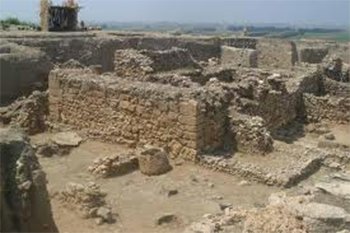It is located in Safita district, in the north of the Akkar plain on the north of the al-Abrash river approximately 18 kilometres (11 mi) south of Tartus Governorate, according to archaeological encyclopedia.
The tell was first surveyed in 1956 after which a lengthy discussion was opened by Maurice Dunand and N. Saliby identifying the site with the ancient city variously named Sumur, Simyra or Zemar (Egypt. Smr Akkad. Sumuru or Assyrian Simirra. The ancient city is mentioned in the Bible, Book of Genesis (Genesis 10:18) and 1 Chronicles (1 Chronicles 1:16) as the home of the Zemarites, an offshoot of the Caananites. It was a major trade center and appears in the Amarna letters; Ahribta is named as its ruler. It was under the guardianship of Rib-Hadda, king of Byblos, but revolted against him and joined Abdi-Ashirta’s expanding kingdom of Amurru. Pro-Egyptian factions may have seized the city again but Abdi-Ashirta’s son Aziru recaptured the city.
 The tell was first excavated between 1960 and 1962 by Maurice Dunand, N. Saliby and A. Bounni who determined a sequence between the Middle Bronze Age through to the Hellenistic civilization. The most important occupations were determined to have taken place during the Late Bronze Age and Persian Empire.
The tell was first excavated between 1960 and 1962 by Maurice Dunand, N. Saliby and A. Bounni who determined a sequence between the Middle Bronze Age through to the Hellenistic civilization. The most important occupations were determined to have taken place during the Late Bronze Age and Persian Empire.
In 1985, new excavations began in partnership between the Archaeological Museum of the American University of Beirut and the Directorate-General of Antiquities and Museums in Syria under the directorship of Leila Badre. A large amount of imported pottery from Cyprus was found dating between the 14th and 12th centuries BC and contrasting to other sites in the Homs gap. The city was destroyed during the Late Bronze Age, after which local Mycenaean ceramics, Handmade burnished ware and Grey ware replaced the imported pottery. Architectural remains at the site include a palace complex and temple that were dated towards the end of the Late Bronze Age. The temple contained a variety of amulets, seals and glazed ware that showed similarities with the culture of Ugarit. A later Iron Age settlement was detected between the 9th and 8th centuries BC which was brought to an end with evidence of burnt destruction caused by a currently unidentified Assyrian invasion. A warehouse and defensive installation made out of ashlar blocks were found dating to the Persian period with further evidence of Hellenistic occupation evidenced by a large cemetery in the northeast of the site.
M.W

